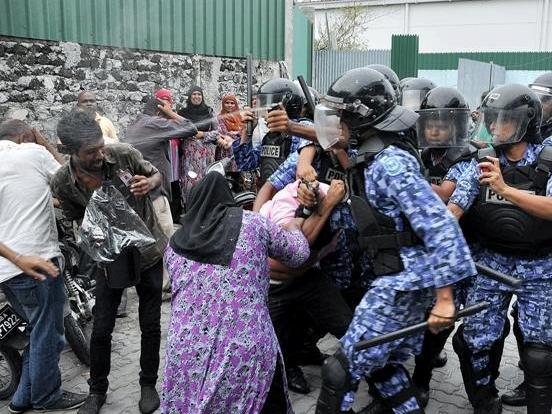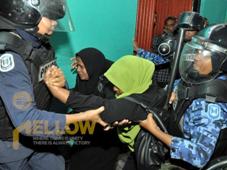Opposition Maldivian Democratic Party (MDP) MP Imthiyaz ‘Inthi’ Fahmy – who is also one of the party’s spokespersons – is set to face another criminal charge of “disobeying orders” over allegedly contemptuous remarks he made against the judiciary during a television show.
Earlier in April, Fahmy told Minivan News that Police had begun investigation of a case filed by the Department of Judicial Administration against him, over his allegedly “contemptuous remarks” against the Supreme Court and its judges.
Police Media Official Chief Inspector Hassan Haneef told Minivan News at the time he was “unsure” whether police were currently investigating the matter, but said cases concerning contempt of court had previously been investigated and sent for prosecution.
In June 2012, police sent a case concerning Imthiyaz Fahmy for prosecution, requesting he be charged with disobeying orders, obstructing police duty and physically assaulting a female police officer during an MDP demonstration on May 29, which had followed the dismantling of the party’s protest camp at Usfasgandu.
In a subsequent statement condemning “excessive use of force” against demonstrators, Amnesty International stated that according to Fahmy, “police in Dhoonidhoo told him he was arrested for ‘disrupting peace’.”
“The next day in court, police stated that he had been detained for ‘physically attacking a woman police officer.’”
Fahmy denied the charges pressed against him by the prosecution.
In the latest case, Fahmy will be prosecuted under section 88 of the Penal Code for disobeying legal orders.
Section 88(a) states – “It is an offence to disobey an order issued lawfully within the Shari’ah or Law, person guilty of this offence shall be subjected to a punishment of exile or imprisonment or house detention not exceeding 6 months or fine not exceeding MVR 150.00 (US$9.73)”
Speaking to Minivan News earlier regarding the charges, Fahmy claimed the judiciary was attempting to silence elected members of the public, and that allegations of contempt of court were a facade.
“People elected me to find faults in institutions such as the courts and find ways to reform them, to correct those faults. I have been elected as a member of parliament by the people to talk about such issues and that is my responsibility. It is a duty vested in me by the people and I will remain firm in executing that duty,” Fahmy said at the time.
He further claimed that discrepancies and flaws within the courts were already being widely discussed by the general public.
“The courts themselves do not comprehend the real meaning of the concept of judicial independence,” he claimed.
“They should also understand that dignity and honour is not a one-way train. It goes both ways. Their actions should be of a standard and performed in a transparent fashion so as to have dignity,” he said.
“The first thing is that the judges were wrongfully reappointed. The constitutional provisions indicate that the judges were appointed by the Judicial Service Commission (JSC) wrongly without proper consideration being given to Article 285 of the constitution. That is unconstitutional.”
Fahmy – who is a lawyer himself – claimed that other powers of the state including the legislature and the executive had been set up in accordance with the 2008 constitution and that it was only the courts and the judiciary that had failed to be established in accordance with the new constitution.
“Am I being punished for coming out and speaking the truth? What is so wrong about reiterating the same facts that are being highlighted by several respected international authorities on the same issue?” he questioned.
Apart from Fahmy, cases against several other MDP MPs are either being currently investigated or being heard in the courts including that of MP Ali Waheed (the party’s Deputy Parliamentary Group Leader), MP Hamid Abdul Ghafoor (the party’s spokesperson for international affairs), MP Abdulla Jabir, MP Mohamed ‘Matrix’ Rasheed and MP Ibrahim ‘Bondey’ Rasheed.
Charges faced by the MPs include contempt of court, obstruction of police duty as well as the offence of consumption of alcohol. According to the constitution, a member of parliament loses his seat should he be convicted of a criminal offense that requires serving a sentence longer than a period of 12 months.
 “I came to know about them after the rumours started spreading on social media networks. But no country had informed of us anything officially,” local media reported Nazim as saying.
“I came to know about them after the rumours started spreading on social media networks. But no country had informed of us anything officially,” local media reported Nazim as saying.
